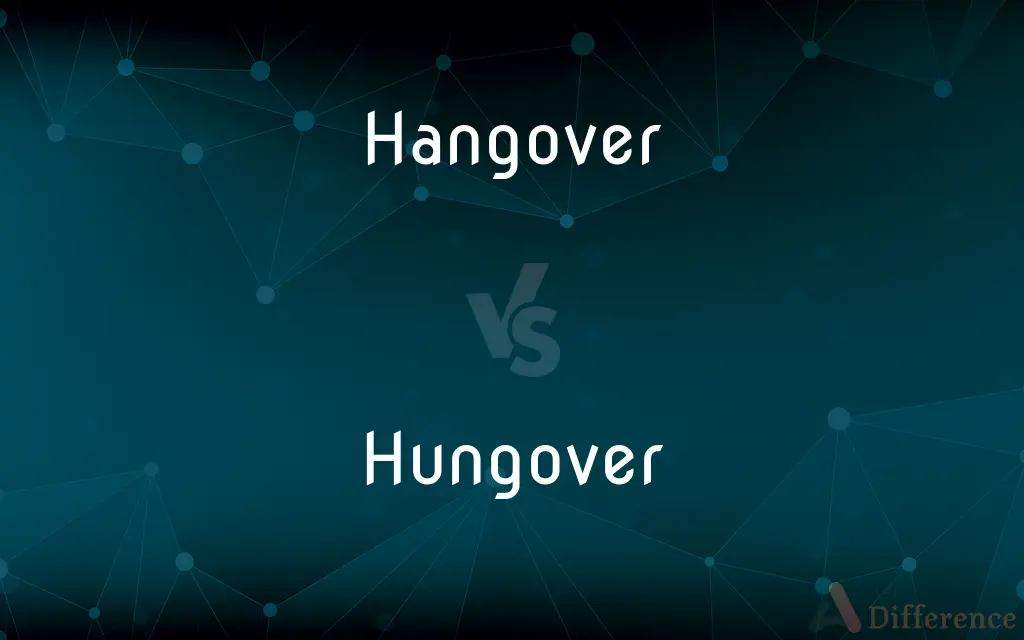Hangover vs. Hungover — What's the Difference?
Edited by Tayyaba Rehman — By Urooj Arif — Updated on March 25, 2024
A hangover is a condition with symptoms like headache and nausea after excessive drinking, while hungover describes the state of experiencing a hangover.

Difference Between Hangover and Hungover
Table of Contents
ADVERTISEMENT
Key Differences
A hangover refers to the physiological condition that follows the consumption of excessive alcohol, characterized by various unpleasant symptoms such as headache, nausea, sensitivity to light, and dizziness. On the other hand, hungover is the adjective used to describe someone who is suffering from a hangover, indicating their current physical state.
The term "hangover" encompasses the entire range of symptoms and is used to discuss the condition in a general sense. For instance, one might research ways to prevent or cure a hangover. Whereas "hungover" is used more personally and specifically, as in telling a friend, "I'm feeling really hungover today," to convey one's physical state after drinking too much alcohol the night before.
Discussing a hangover often involves talking about its causes, such as dehydration, the body's reaction to alcohol metabolites, and poor sleep quality. On the other hand, describing oneself as hungover usually leads to sharing personal experiences or remedies that might help alleviate the symptoms.
When people talk about hangovers, they often discuss them in a broader context, such as their impact on productivity, healthcare, or even culturally, in terms of social drinking behaviors. Meanwhile, saying someone is hungover typically focuses on the immediate, personal experience and might involve discussing short-term solutions like hydration, rest, or consuming certain foods.
In literature or formal writing, "hangover" might be used to describe the condition in a clinical or detailed manner, examining its physiological aspects. Conversely, "hungover" is more likely to appear in casual conversation or first-person narratives, providing a direct insight into the speaker's or character's current condition.
ADVERTISEMENT
Comparison Chart
Definition
A condition caused by excessive alcohol consumption
Describing the state of having a hangover
Symptoms Included
Headache, nausea, fatigue, dizziness
Implies experiencing symptoms of a hangover
Usage
Noun, referring to the condition
Adjective, describing a person's state
Context of Discussion
General, often includes prevention and cure
Personal, focuses on immediate experience
Typical Associated Actions
Researching remedies, discussing impacts
Expressing personal discomfort, seeking relief
Compare with Definitions
Hangover
A collective term for the negative symptoms experienced after drinking too much.
They discussed the best foods to eat for a hangover.
Hungover
Feeling ill or exhausted from drinking too much alcohol.
She felt too hungover to attend the morning meeting.
Hangover
An experience of after-effects such as dehydration and fatigue due to heavy alcohol consumption.
The hangover made it difficult for him to get out of bed.
Hungover
Used to express the physical discomfort following heavy drinking.
Despite being hungover, she tried to go about her day.
Hangover
A condition characterized by various unpleasant symptoms following the excessive intake of alcohol.
Searching for a hangover cure became her morning routine.
Hungover
Describing the state of suffering from a hangover.
He called in sick because he was hungover.
Hangover
A physiological reaction to alcohol, including symptoms like sensitivity to light and sound.
She never expected the hangover to be so severe.
Hungover
Indicating a personal experience of hangover symptoms.
He was too hungover to remember what happened last night.
Hangover
The aftermath of drinking too much alcohol, marked by headache and nausea.
He woke up with a terrible hangover after the party.
Hungover
Characterizing the immediate condition of someone after excessive alcohol consumption.
They were all hungover after the New Year's Eve celebration.
Hangover
A hangover is the experience of various unpleasant physiological and psychological effects usually following the consumption of alcohol, such as wine, beer, and distilled spirits. Hangovers can last for several hours or for more than 24 hours.
Hungover
Suffering from a hangover.
Hangover
A severe headache or other after-effects caused by drinking an excess of alcohol.
Hungover
Suffering from a hangover.
Hangover
A custom, habit, feeling, etc. that survives from the past
This feeling of insecurity was in part a hangover from her schooldays
Hangover
A temporary, unpleasant physical condition, typically characterized by headache and nausea, following the consumption of an excessive amount of alcohol.
Hangover
A letdown, as after a period of excitement.
Hangover
A vestige; a holdover
Hangovers from prewar legislation.
Hangover
Negative effects, such as headache or nausea, caused by previous drunkenness due to (excessive) consumption of alcohol.
I really enjoyed yesterday’s party, but now I have the biggest hangover – I’ll not be doing that again any time soon.
Hangover
Similar negative effects caused by previous excessive consumption of another substance, such as a drug, coffee, sugar, etc.
Hangover
(figurative) An unpleasant relic left from prior events.
Hangover
(historical) A sleeping arrangement, usually in homeless shelters, over a rope.
Hangover
An unpleasant feeling, such as a headache, occurring as an aftereffect from the use of drugs (especially alcohol).
Hangover
An official who remains in office after his term.
Hangover
Disagreeable aftereffects from the use of drugs (especially alcohol)
Hangover
An official who remains in office after his term
Hangover
Something that has survived from the past;
A holdover from the sixties
Hangovers from the 19th century
Common Curiosities
Are there any surefire cures for a hangover?
While there are many suggested remedies, there's no universally acknowledged cure for a hangover; hydration and rest are commonly recommended.
Can you be hungover without drinking alcohol?
Typically, being hungover specifically refers to the after-effects of drinking too much alcohol, so it wouldn't apply to non-alcoholic contexts.
How long does a hangover last?
A hangover can last up to 24 hours, but the duration varies depending on the individual and the amount of alcohol consumed.
Can eating certain foods prevent a hangover?
Eating before and while drinking can slow alcohol absorption and may mitigate some hangover symptoms, but it doesn't prevent a hangover entirely.
What's the main difference between a hangover and being hungover?
"Hangover" is a noun describing the condition, while "hungover" is an adjective describing the state of experiencing that condition.
Is a hangover a sign of alcohol poisoning?
A hangover and alcohol poisoning are different; the latter is more severe and can be life-threatening, requiring immediate medical attention.
Can exercise help cure a hangover?
Gentle exercise might help some people feel better, but it's not a cure; hydration and rest are more effective.
Do hangovers get worse with age?
Many people report that hangovers become more severe or harder to recover from as they get older.
Why do some people get hangovers more easily than others?
Factors like genetics, hydration level, and overall health can influence how severely and quickly one experiences a hangover.
Can hydration prevent being hungover?
While staying hydrated can help mitigate some symptoms, it doesn't entirely prevent a hangover if a large amount of alcohol is consumed.
Is it possible to have a hangover without realizing it?
Some people might not immediately connect their symptoms to alcohol consumption, especially if they're mild, so it's possible but unlikely.
Can you be hungover and still have alcohol in your system?
Yes, being hungover can occur while your body is still processing alcohol, leading to impaired abilities and judgment.
Is there a psychological aspect to hangovers?
Yes, apart from physical symptoms, some people experience feelings of anxiety or depression during a hangover.
Does the type of alcohol consumed affect the hangover?
Yes, darker liquors and certain types of alcoholic beverages are often reported to cause more severe hangovers.
What's the best way to describe feeling hungover to someone who's never experienced it?
It's often described as feeling like a severe flu, with symptoms like headache, nausea, and overall malaise.
Share Your Discovery

Previous Comparison
Creativeness vs. Creativity
Next Comparison
Clean vs. NeatAuthor Spotlight
Written by
Urooj ArifUrooj is a skilled content writer at Ask Difference, known for her exceptional ability to simplify complex topics into engaging and informative content. With a passion for research and a flair for clear, concise writing, she consistently delivers articles that resonate with our diverse audience.
Edited by
Tayyaba RehmanTayyaba Rehman is a distinguished writer, currently serving as a primary contributor to askdifference.com. As a researcher in semantics and etymology, Tayyaba's passion for the complexity of languages and their distinctions has found a perfect home on the platform. Tayyaba delves into the intricacies of language, distinguishing between commonly confused words and phrases, thereby providing clarity for readers worldwide.
















































